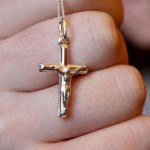Europe Fights Crucifix Ban
 Eight European countries have joined a petition by Italy to overturn a European court ban on Christian crosses in classrooms.
Eight European countries have joined a petition by Italy to overturn a European court ban on Christian crosses in classrooms.
Yesterday, Armenia, Bulgaria, Cyprus, Greece, Malta, San Marino, Romania, and Russia joined Italy in arguing against the European Court of Human Rights, claiming that the Court ought to overturn its 2009 ruling banning crucifixes in Italian classrooms.
Italy, like France, claims to be a highly secular state – a state in which religion and government are not formally linked in any discernible way. In France’s public institutions, such as government offices, schools, etc., it is not only illegal to wear religious headscarves, burqas, and yarmulkes, but also illegal to wear “ostentatious” cross necklaces or other Christian symbols.
Similar secular laws and traditions apply in Italy… with one glaring exception: Many Italian classrooms still display a crucifix above the center of the chalkboard.
Last year, the European Court of Human Rights ruled in favor of Soile Lautsi, an Italian mother, who claimed that her children ought to be afforded a secular education and demanded that crucifixes be banned in schools. The ban has not been dutifully enforced, to say the least.
While in northern Italy, visiting a friend this past spring, I noticed the crucifix displayed in the classroom of my friend’s secular high school. It was especially interesting that although a crucifix was unabashedly exhibited in the front of the room, the professor maintained a completely neutral tone during the religion class – an hour-long lesson that took on more of a comprehensive philosophical nature than a religious one.
In the government’s June 30th appeal, Italy sought to repeal the ban, insisting that the crucifix is a "passive symbol with no relation to teaching,” and with strong historical roots in the country.
Although Italy maintains that it is a secular state, like France, its religious ties are intensely embedded. Not only is the country’s capital, Rome, the home of the Catholic Church’s headquarters, Vatican City (albeit, Vatican City is technically an independent country, situated in the middle of Italy), an estimated 90% of Italians consider themselves Catholics. The government has required, by law, that crucifixes be displayed in schools since the 1920s, and it was only in 1984 that Italy abandoned Catholicism as the country’s official religion.
“I’m not religious at all,” claims an Italian friend, “neither are many of my friends. But the cross – it is everywhere. No one really minds. Every town has an old church in la piazza (town square). They are beautiful. The church is a part of our culture.”
However, the majority representation of Catholics throughout the country and the unified opposition of nine countries to the crucifix ban may not be enough to sway the Court’s ultimate decision – which is to be made this coming fall by a 19-judge panel.
According to recent polls, “trust in religious institutions is extremely low in most European Union countries,” with only 31% of Italian Catholics attending church weekly.
As fewer and fewer people identify with religious institutions, support for secular institutions grows exponentially – a support which will inevitably lead to the reversal of even the most imbedded traditions.